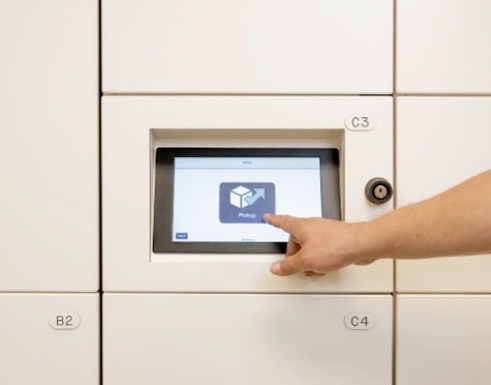Finishing & Screen Printing
Ricoh and Clemson University enhance student experiences with Intelligent Lockers

Tuesday 13. October 2020 - New technology offers contactless package retrieval, reduces wait times and improves satisfaction with campus mail services. Clemson University and Ricoh USA, Inc. expand their partnership to enable students to conveniently pick up packages with contactless retrieval, allowing them to reduce trips to the mail center.
The installation of more than 500 Intelligent Lockers on campus is making package retrieval for students faster, safer and more secure. This latest collaboration builds on Ricoh and Clemson’s previous work to modernize the campus student mail center.
The new Intelligent Locker solution is expediting and streamlining package retrieval for students by making packages available for pickup on their schedule at a location convenient for them in a contactless environment.
Now, when a student’s package arrives on campus, the mail services team scans and delivers it to the bank of secure Intelligent Lockers that is closest to the student’s residence. By doing this, the need for a student to visit a mail center is limited, which for some is not conveniently located. Once the package is in the locker, the student receives an email with a one-time use release code to unlock and retrieve their package.
The solution also allows students to unlock the lockers using contactless options such as tapping their student ID card or scanning a QR code received in an email on their smart phone, eliminating the need to enter a code and further limiting contact required to retrieve packages.
During the initial pilot, more than 1,400 packages were delivered and student wait time at the mail center decreased by 13% during move-in week, which is their busiest time of the year. In addition, 98.5% of students who used the solution reported being extremely satisfied with their overall experience and more than 95% stated they saved time.
“Our biggest complaint has been from students who were not included in the original pilot, they also want access to the Intelligent Lockers,” said Lori Brierre, Strategic Operations Director, Procurement and Business Services, Clemson University. “We’re thankful to be rolling it out for more students this fall. Our students like to do things on their own time, on their own terms, and ideally in a very streamlined fashion – and now with the coronavirus pandemic – we anticipate options for contactless pickup to be a new ask. Their technology expectations are high, and once again Ricoh’s perspective on ideas that drive change, like Intelligent Lockers, is helping us meet and exceed these expectations.”
With package volume handled by the United States Postal Service reaching 6.2 billion pieces – doubling over the past decade – driven in part by Generation Z’s appetite for online shopping, Intelligent Lockers are a low-profile real estate solution to handle the growing quantity of packages delivered to Clemson. The Lockers help ensure the University’s students receive the packages they want, without giving up precious space needed for instruction.
While packages are on the increase, overall mail volumes have dropped nearly 17% in the last decade, indicating a drop-off in flat mail and impacting college mail centers designed decades ago to handle daily student letters vs. packages. As a result, many universities are modernizing their mail approach.
“We have a deep understanding of just how better, more intelligent processes and devices can improve the student experience,” said Renaud Rodrigue, Partner Executive, Client Strategy, Ricoh USA, Inc. “Sometimes it’s something seemingly small, like changing the way a college digitizes admissions paperwork. And sometimes, it’s a clear and striking difference, such as removing outdated, underutilized P.O. boxes and redesigning the student mail experience from the ground up. We’re excited to continue to expand phase two of this program to the rest of the Clemson campus.”
As Clemson welcomes students back to campus, Intelligent Lockers are an example of how the University is adapting a process that is both socially distant and highly efficient.
